Remember watching that Metal Gear Solid V: The Phantom Pain trailer that was unveiled at E3 2013? Do you remember first hearing those sweeping, powerful notes of the game’s vocal theme, Sins of the Father? I bet you do. But how much do you know about the amazing voice behind that and the Peace Walker vocal theme, Heaven’s Divide?
You might be surprised to find out that Donna Burke, the vocalist behind those two songs – and the voice of the in-game IDroid – has a very long and storied history doing English voices and musical work for numerous games from within Japan. Her list of previous projects includes numerous classics and fan favorites, and through her music and talent agency Dagmusic – which she owns and manages – she continues to provide the Japanese game industry with valuable voiceover and sound services.
I had the opportunity to talk with Donna about her past and previous work, how she came to Japan, what the English voiceover industry in Japan is like, all those different English accents, and – of course – those amazing Metal Gear songs. Read on!
Thank you very much for letting us interview you, Donna! First, I would like to ask: How did you initially wind up in Japan?
– I’m from Perth, in Western Australia. A lot of people told me in the early 90s, “Oh my god! You should go to Japan, Donna! I can’t even sing, and I got all this work!” Because it was still the tail end of the bubble economy… I was on sabbatical from my high school teaching job, a and decided to – well, my dream had been to be a professional singer/actor, so I thought, “I’m gonna go for it!” And I never went back to Perth.
When I was in London, I applied for a job teaching English in Tokyo, and I got it. I was really poor for about a year – so broke! – but I just had this belief that something great was gonna happen. And I was right!
That seems to be the way a lot of people do it – ESL and living on ramen for the first year or so.
– Yes, that’s what happened.
Your husband came along with you?
– No, actually, I met him in Japan! I was desperate and dateless back in Perth. It wasn’t until I came to Tokyo – one would think there’d be no chance for me here, but I met my husband within a few months. We became friends, and then we started going out about a year after I came to Tokyo.
So you got started off in Tokyo, then.
– Yes, and I’ve never left.
What was it about Japan that you felt really spoke to you?
– Nothing, really. Actually, I was quite fortunate – I had no love of Japan, I was not into anime or game culture at all. A lot of people have this wonderful fantasy image of Japan, and then they come here and that fantasy’s destroyed. I never had that. I just came as an indifferent person with no preconceived knowledge of anything, really.
I think that actually made it easy for me. I just saw things, like… “Wow, that woman’s taking three kids to school on a bike! That would never happen in Perth!” I was just able to enjoy learning about the culture without any preconceived ideas, so I’ve never been disappointed. It’s always been original and entertaining and new, but never disappointing.
Yeah, there’s always something going on in Tokyo. So how did you get set up with your business there?
– It was 2004, and I had been working as a session singer and voiceover artist since 1997. A lot of people knew who I was. One of my clients said “Oh god, I am so sick of getting on the redeye to LA or London to be able to record singers.” But I knew I could get them good local singers. That’s basically how I started as an agency – it was surprisingly easy.
I don’t speak Japanese very well, even after being here this long – I’m beyond being ashamed of that. I went through a period of deep disappointment in myself for that, but now I’m over it. I’ve got other talents. Some people are really, really amazing bilingualists, but my talent is… not learning Japanese. But I have other things I’m good at!
*Laughs* You mention doing voiceover work since about 1997. How did you get started with that?
– What you do is a make a demo, and where I grew up, it had to be a demo of stuff you’ve actually done. In Tokyo, you don’t – you just have to have a demo demonstrating what you can do. Which, I think is very freeing, because you can start from absolutely no experience. If your demo is really good, then you can start getting work. That’s what I did – I made a demo, and started getting work. A lot of my friends are in the same business, so we’d exchange tips about which agents were good. One of the things I’ve found – and it’s not unique to Japan – is that there are agents who will try to rip you off. (My policy at Dagmusic is not to gouge.) If an artist or a client or an agency is really horrible, the great thing about being a freelance voice actor – or having a company – is that you can just never work with them again.
Who were some of your first videogame clients?
– One of the most memorable early jobs I had was winning the audition to play Angela in Silent Hill 2. I got to do her motion capture and voice, and I also got to do the motion capture and voice for zombies.
Oh, you did the motion capture, too?
– Yes, that was really fun! Truth is, you don’t do many auditions as a voice actor, everything is done through your demo tape, but the Silent Hill auditions were like a full-on acting audition. It was very disgusting – in the audition, I mean – I had to eat a fetus. I had to watch a fetus of the messiah get aborted and then eat it, and then go mad. I could never watch someone do that, but I could totally do it myself, playing the part. It was really weird!
Just so your readers know – I don’t really play videogames. I can’t even watch a lot of movies, they’re just too scary for me. But the weird thing is – I can totally do a zombie voice. *laughs* When I was 16, I watched the original Alien, and the first minute of that movie… I was shitting myself, just from the music! I was just like “oh no…. ohhh nooooo…!” I think I’m just super-sensitive to music and sounds. I’ve learned that about myself…
But I can watch someone else do it! I can watch someone else play a videogame, maybe, but… I actually think I’m gonna die, so… it’s parasympathetic, my system goes into overdrive.
*Laughs* Well, I’m curious how you came to Konami!
– This was before I had a company – they just had an audition through local talent agencies, that’s how.
I’m rather curious… you’d always hear these rumors about late-90s Japanese games with English VO. Like, you’d hear they’d just find some gaijin on the street and drag them into a recording booth.
– I can honestly say that never happened to me! All the people I worked with – it was all the top people in Tokyo. One thing people don’t realize is that there’s a lot of amazing voice talent in Tokyo, because there’s a multi-million-dollar industry of producing recordings for English textbooks. For a lot of voice actors, that’s their primary work. So there’s quite a bit of good talent here. Not as much as in LA, though, that’s for sure…
It still happens now, though – you get people ringing up my company and saying “Oh, that’s just too expensive. We’ll just get our friends to do it.” Hey, if that works for you, go on over to Roppongi crossing and get some English teachers. Maybe some of them are secretly really great.
But it’s not only about voice talent, it’s about – well, they might have a great demo, but can they take direction? Do they have range? Are they nice to work with? Are they professional? You’d be surprised how many average talents get a good reputation just because they show up 20 minutes early to their jobs, they’re never late, they’re super pleasant and nice to work with. They’ll get a lot of work, not because they’re the best, but because they’re consistent. There are probably people reading thinking, “I’d never do that if I was in that industry!” but there are just some idiots who don’t get it. They don’t get how lucky they are.
Besides Konami, you’ve done a lot of work with Sega. How did you come to get involved with them?
– Again, just through other agencies. I know a few people there personally now, but at the time, I just auditioned with my voice tape. It wasn’t terribly interesting, I’m afraid.
So was Shenmue your first project with them?
– I think it was, yes. I remember getting really lost, because they’ve got about five buildings around the same station.
Yes! And they always change! Departments are in different buildings every time I go there, I swear!
– Yeah! I think Shenmue really screwed up Sega, because the company that was managing the talent and the time just completely gouged them. It was in the Guinness Book of World Records for a while as the most expensive game ever made. I can say that they made serious errors on how they did the voices.
Can you go into more detail about that?
– I can’t really name names, but I remember I was there, being overpaid – and I knew I was being overpaid – 100,000 yen, which is about 1,000 dollars – for our session. I said five words. It was great, I was just sitting there in the back, chatting with all my mates gossiping – getting paid to do almost nothing.
That sure does sound like what happened with Shenmue alright. You also did some stuff for Sega later on, including a character very near and dear to my heart, Vanessa from Virtua Fighter.
– Ahhh, is that the really bitchy one? With a British accent?
*laughs* You could say that. No British accent, though…
– Oh, I think I actually used an Australian accent, my normal accent. But you know what – I get a script, I get a picture of a woman with massive bosoms, and I just – read the lines. And then I’m done. It’s not particularly artistically satisfying. I think that’s why people who are good at improv are good with this sort of stuff – we can do this stuff in hear head and make it fun for ourselves. But honestly, it wasn’t anything memorable for me.
(Editor’s note: I later found out from Donna that she did not, in fact, do Vanessa’s Virtua Fighter 5 voice – that was another actress named Bianca Allen. However, Donna is credited for Vanessa in VF4 and Virtua Quest.)
Do you get any direction from the Japanese sound team in that respect, or is it just “We don’t know English, so we’ll leave this up to you?”
– Pretty much. They’ve already cast your voice, so they’ve heard what they want. You go in and give them three or four takes, and they’ll just say “I want that one.” Often these people are really young, so I sort of help them a little bit – “Look, I’ll do this four different ways, you tell me which way you like it.” And then I do the rest the way they like. I don’t ask them, “What’s my character’s backstory?” I look at the boobs, I look at the haircut – that tells me everything I need to know. Skimpy leather costume, is she a bitch? Cool, lock that in and off I go.
For example, with the IDroid voice I did for Metal Gear Solid V recently, I went in and did a few different types of voices. Eventually I just hit on one where they said, “Yes, yes, that one!” – which is basically how I talk on the Shinkansen. Sometimes they might have to say, “Oh, you sound a little bit different.” But most of the time, you just lock it in and off you go.
https://www.youtube.com/watch?v=dhxtfpYo7yo
What about the vocal song side of things? You’ve done a lot of work in that area, as well. I’ll tell you right now – being at E3 in 2013, your voice in Sins of the Fathers was the most omnipresent and powerful thing. You could hear it all throughout that massive exhibition hall.
– They did that at TGS, too! I have to say, I got a bit of a thrill every time I heard my own voice. It’s such an awesome, fabulous song. It’s such an honor, honest to god. The best song I’ve ever done.
How much input do you have on the lyrics and composition of these songs?
– Sometimes I get to write lyrics, which is really great. I love writing lyrics. Doing these lyrics in English with a Japanese melody can sometimes be a little bit challenging. With Heaven’s Divide, I was given the lyrics, and I didn’t really like a couple of them. But looking back, I didn’t even know what the song was for at the time – I tend to operate from a position of not knowing much, but because of my background in improv, I’m quite comfortable not knowing everything.
So with Heaven’s Divide, there were a couple of lyrics I didn’t like, so I suggested different lyrics to Honda-san and the team accepted them. For Sins of the Father, he gave me a few demos – he came to me with two different songs, and he wanted me to fake lyrics to the songs, which I did. He said that Kojima-san just wanted to feel what it sounds like. So I wrote my fake lyrics, sang the two songs, and they said “We like this one better, but we like this part of the other song,” so they kind of melded them together.
Ludvig then wrote the lyrics, and we went on to do several demo recordings. It really is about the fans – the fans are… really indulged by Kojima. Just pure indulgence! They wanted to exceed every expectation from Heaven’s Divide and just slam it out of the ballpark into another galaxy. Which I think they’ve achieved, absolutely. That song really was the most input I’ve ever had, from multiple demos, multiple takes, Kojima-san coming back with lists of things he liked and didn’t like, change this, change that… it was really fun, and very satisfying.
So how involved was Kojima himself in the recording sessions?
– Hmmm, well, he didn’t come to LA for the main recording with us… we actually flew to LA for the main recording of the song. Kojima-san wasn’t there, but Honda-san was. Ludvig, poor darling, was stuck on Skype half-asleep watching the recording. For the IDroid, though, he was in the recording for that. He’s very involved in that part. That’s not to say he wasn’t involved in the Sins of the Father recording, he just wasn’t physically there.
Is being flown outside of Japan for these gigs a common occurence, or-
– That’s actually never happened before! The one I recorded in was Capitol, where famously Judy Garland and Frank Sinatra recorded. It was a really wonderful experience.
The best is yet to come, when it releases. Trust me, it’s going to be massive.
Sounds good to me!
We’ve been working on this since December 2012, two years now. The fans have been waiting a long time.
In terms of VO and singing, is there any demand for a particular accent in Japan?
– American is definitely the most popular, but sometimes you get requests for British accents depending on the character. Claudia from Silent Hill 3 had a British accent, for example.
Is there a particular reason for the popularity of the American accent?
– Japan just doesn’t realize that English has so many different accents.
Are they just attuned to what they hear from Hollywood output?
– No, most Japanese can’t recognize American to British to New Zealand to Australian. So if you ask, they’ll just go “Oh…. um, American?” Very occasionally you’ll get directions like “We want a British accent because this is primarily for a British audience, and they want to hear their own accent.”
You occasionally get specific requests in entertainment media. For the Ace Combat audition, Namco specifically asked for things like Australian, Irish accents. It’s getting more varied now as the Japanese public is getting more educated about that.
Really, though, even Hollywood gets it wrong. Like for Pacific Rim, they had two Brits doing the main Australian accents, and it was painful for Australians to watch that!
Perhaps your most widely heard role is that of the English announcer of the Tokaido Shinkansen, the incredibly fast bullet train that will take you all across Japan’s central Honshu island. That’s obviously a really big deal – what sort of instructions do you get when recording something like that?
– They asked for a British accent because they though the previous accent was British, but in fact, it was a Canadian woman who had done it for about eight years before me. It was actually a very neutral accent. When I first recorded it, I did use a British accent, but then I had to re-do the whole thing and thought, “They don’t even know!” So I wound up using a sort of posh Australian accent.
Really! I remember hearing that for the first time and being puzzled because I couldn’t place the accent at all.
– If an Australian heard it, I’m pretty sure they can identify it as an Australian woman. Americans, I think, seem to expect all Australians to talk like Steve Irwin. *mimicking Steve Irwin* Welcome to the Shinkansen!
As a final question, of all the work you’ve done in the gaming world, what is the work that means the most to you?
– Sins of the Father, without a doubt. There’s something really powerful about that song on a non-language level – just the sound and the chords. For voice acting… I would say Claudia from Silent Hill 3. It was the most evil, and yet, the most sympathetic role… she was just kind of a nutjob. It was really satisfying to do the motion capture and the voice. I wasn’t just reading a bunch of lines, I was doing so much with the character. It took days and days, it was really fun.
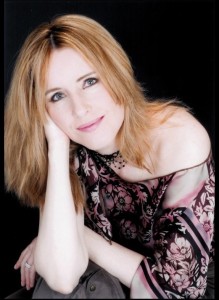 The weirdest thing is… I look like Claudia now!
The weirdest thing is… I look like Claudia now!
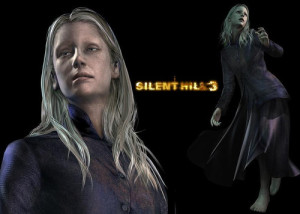 I was not a blonde back then. I am now blonde, and have long back hair… if I shave my eyebrows off, I look like Claudia!
I was not a blonde back then. I am now blonde, and have long back hair… if I shave my eyebrows off, I look like Claudia!
Thanks again to Donna for giving us her time for a great interview! If you’re interested in her work, please visit her site at donnaburke.com.
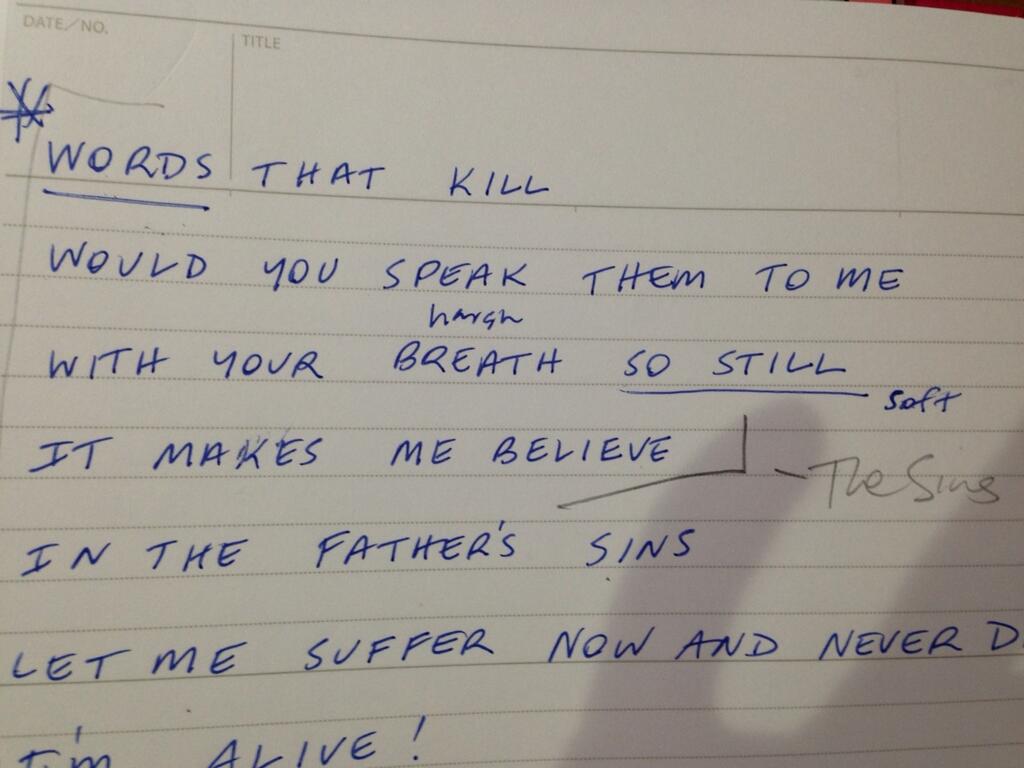
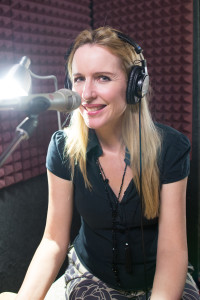 –
–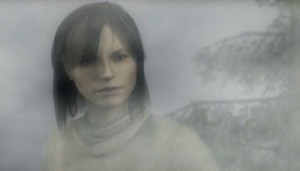
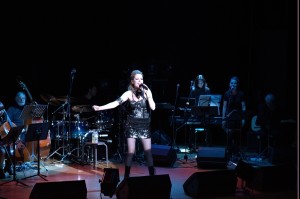

My only comment is that I would love to send Donna Burke a personal email and explain the fact that her voice puts my autistic daughter to sleep every night and that I admire her and that’s an amazing woman yes she’s 20 years older than me but she’s an amazing woman